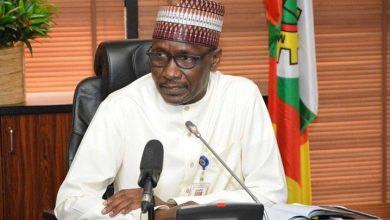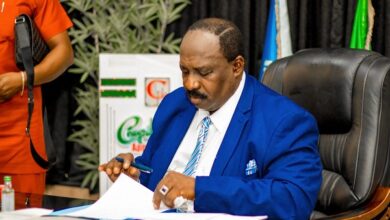Electricity Subsidy Hits N1.91tn In 11 Months

The monthly spending of the Federal Government on electricity subsidy obligation has reached N1.91tn in the first 11 months of 2024, a new report by the Nigerian Electricity Regulatory Commission has disclosed, The Courage.
It also stated that power distribution companies collected a total revenue of N1.23tn during the first nine months of 2024, exceeding the total revenue generation of N1.08tn in 2023.
An analysis of figures from the power sector regulator’s monthly supplementary order posted on its website on Sunday indicated that electricity subsidies continued to increase every quarter throughout the year despite the elimination of subsidies for Band A customers.
The amount incurred between January and November 2024, represents an increase of 204.15 per cent or N1.283tn from N628.61bn recorded in 2023.
A breakdown showed that N633.30bn was incurred as electricity subsidy in the first three months of 2024. It however reduced to N380bn in the second quarter.
In the third quarter, spanning July, August and September, the amount surged by 36.46 per cent to N518.55bn. The subsidy costs for October and November were N380.06bn despite several incidents of the national grid collapse.
It was recall that the NERC had on April 3 cut off subsidy payment in areas categorised as Band A, in an attempt to reduce subsidy obligations. This has since raised the tariff in Band A to above N200 per kilowatt-hour from N68.
The absence of cost-reflective tariffs was said to have caused the Federal Government to undertake to cover the resultant gap between the cost-reflective and allowed tariff in the form of tariff subsidies.
The minister of Power, Chief Adebayo Adelabu, had stated that the government would subsidise the power sector with N2.9tn in 2024 without the increase in electricity tariff.
For ease of administration, the subsidy is only applied to the generation cost payable by Discos to NBET at source in the form of Disco’s Remittance Obligation.
The DRO, it was learnt, represents the total Genco invoice that is billed to the Discos by NBET based on what the allowed Disco tariffs can cover.
The transmission and administrative service costs payable by Discos to the Market Operator, an arm of the Transmission Company of Nigeria, are recovered 100 per cent.
However, it should be noted that the power generation cost is a major component that guarantees electricity generation and supply across the country.
In November, a total cost of N67.095bn was incurred as generation costs but Discos were allowed to recover N39.24bn.
However, the initial removal led to a reduction in subsidy costs and revenue to distribution companies to charge cost-reflective tariffs.
An increase in the cost of generating energy means the government has had to incur more costs in recent months.
For instance, generation costs have increased from N63.8 in January 2024 to N117.27 per kilowatt-hour in November.
The document read, “The Federal Government policy on subsidy and electricity tariff provides for a gradual transition to cost-reflective end-user tariffs with safeguards for the less privileged electricity consumers. Accordingly, the government has committed to funding the revenue gap arising from the difference between cost-reflective tariffs approved by the commission and the actual end-user tariff during the transition to cost-reflective tariffs where applicable.”
Last month, the Executive Director of Research and Advocacy of the Association of Nigerian Electricity Distributors, Sunday Oduntan, said the government has not been fulfilling its promise to pay the cost of subsidising the electricity consumed by customers on Band B to E.
According to Oduntan, only customers on Band A pay the right cost of electricity consumed, while the government subsidises about 67 per cent of what other customers should pay.
Also, the share of the NBET invoice to be covered by Discos is determined by the percentage of the generation cost they can recover from the allowed tariff and set out as their Minimum Remittance Obligation in the periodic tariff orders issued by the commission.
However, he said the government promised to pay for the shortfalls, but it has continued to default.
“Today, only people in Band A pay the true cost of electricity. If you are in Band B, C, D, or E, the government is subsidising your electricity consumption by as much as 67 per cent, which means you are not even paying up to half of what you should be paying, and the so-called subsidy is not being paid by the government. It is now a kind of shortfall because it continues to pile up,” Oduntan said.
Meanwhile, electricity distribution companies have increased their earnings from revenue collection to N1.23tn between January and September 2024 surpassing the amount recorded in 2023.
According to an analysis of data released by the Nigerian Electricity Regulatory Commission, which contains Discos’ commercial performance for the seven months, the distribution companies had billed a total of N1.548tn over the period under review but were able to collect N1.228tn, achieving 79.34 per cent revenue collection efficiency in the country.
A breakdown of the monthly revenue showed that N95bn was generated in January out of N130.92bn billed for the month.
The sum of N97bn was collected in February out of projected N113bn, N100.44bn was generated in March out of N126.56bn billed, N142.92bn was made in April out of N178.72bn, and N139.23bn was generated in May out of N191.65bn billed for the month.
In June, the revenue increased to N150.86bn out of an estimated billing of N176.57bn while N162.14bn was collected out of N197.11bn in July. For August, N208.5bn was billed, but N168.7bn was collected, and N225.80bn was billed in September with a collection of N171.58bn.
With the current revenue collection pattern, the Discos have already exceeded their revenue for the whole of 2020 and are underway to break the records for 2021,2022 and 2023 by the end of 2024. Data from the National Bureau of Statistics show an upward trajectory of N526.8bn in 2020, N761.2bn in 2021, N828.1bn in 2022, and N1.1tn in 2023.




